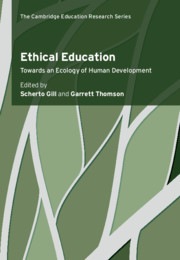Book contents
- Ethical Education
- Ethical Education
- Copyright page
- Contents
- Contributors
- General Introduction
- Part I Theoretical Perspectives on Ethical Education
- Part II Pedagogical Approaches to Ethical Education
- Part III Ethical Education in Practices
- Introduction to Part III
- 7 Re-Learning the Value of Direct Experience
- 8 Cultivating Inner Qualities
- 9 Ethical Relationships in Secondary Classrooms
- Conclusion to Part III
- 10 Towards Systemic Transformation
- Notes
- Bibliography
- Index
9 - Ethical Relationships in Secondary Classrooms
A Case Study of Pedagogical Practices in the United Kingdom and Colombia
from Part III - Ethical Education in Practices
Published online by Cambridge University Press: 30 June 2020
- Ethical Education
- Ethical Education
- Copyright page
- Contents
- Contributors
- General Introduction
- Part I Theoretical Perspectives on Ethical Education
- Part II Pedagogical Approaches to Ethical Education
- Part III Ethical Education in Practices
- Introduction to Part III
- 7 Re-Learning the Value of Direct Experience
- 8 Cultivating Inner Qualities
- 9 Ethical Relationships in Secondary Classrooms
- Conclusion to Part III
- 10 Towards Systemic Transformation
- Notes
- Bibliography
- Index
Summary
Chapter 9 draws on a case study of a pilot project in two secondary schools, one in the United Kingdom and one in Colombia, to illustrate how ethical education spaces can be co-created, sustained and enriched. It regards ethical education practice to consist of at least three aspects: (1) exploring students’ self-awareness which is intimately connected to relationships with others; (2) experiencing one’s feelings, emotions and relations, and (3) inquiring into one’s own and others’ lived realities, and things in the world. These respond to the particular needs and challenges of adolescence and contribute to enriching students’ relationships with self and others, learning and goodness in the world. To present the case study, this chapter begins by considering the needs for relational development during adolescence. It then articulates the conceptual framework underpinning the above ethical education practices. Following a detailed description of each ethical space, the pedagogical intentions underlying it, and the learning processes that the students embarked on within each space, the case study discusses how the participating students have experienced these spaces, and reflects on teaching and learning practices that have enabled these experiences. Finally, this chapter makes suggestions on how ethical spaces might be integrated in secondary education.
Keywords
Information
- Type
- Chapter
- Information
- Ethical EducationTowards an Ecology of Human Development, pp. 149 - 168Publisher: Cambridge University PressPrint publication year: 2020
